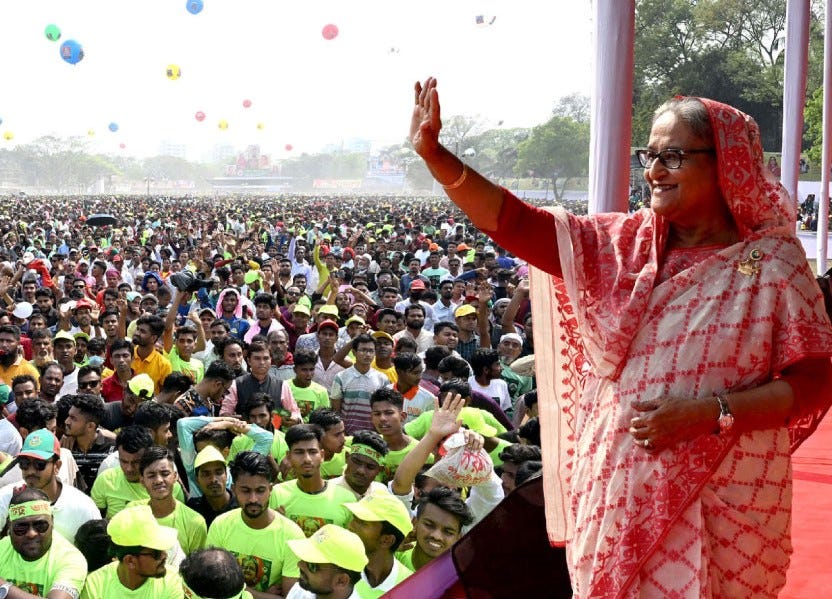How acute is the threat to democracy in Bangladesh?
#53: With Ali Riaz, Ishrat Hossain, Saimum Parvez
The Hundred is a newsletter in which 3 experts answer 1 important question in 100 words. You can subscribe for free. If you’d like to recommend the newsletter to a friend, you can share The Hundred below. Thank you!
With a population of around 170 million, Bangladesh used to be one of the largest democracies on earth. Over the last decade or so, that status has repeatedly been called into question by activists, journalists and foreign governments. So how serious is the threat to Bangladeshi democracy?

“Bangladesh has witnessed significant democratic erosion since 2011, when the ruling Awami League removed a longstanding system of non-partisan caretaker government to oversee elections. Two consecutive fraudulent elections, in 2014 and 2018, have created de facto one-party parliaments and concentrated power in the hands of Prime Minister Sheikh Hasina. Legal and extralegal measures have been used to silence criticism, persecute the opposition, and decimate civil society. Bangladesh is quietly autocratizing, and its electoral system is designed to ensure the incumbent’s victory in the 2024 election. Bangladesh stands at a crossroads; another sham election will eliminate any possibility of multi-party democracy.”

“The upcoming national election, due in December or January, will be a litmus test for Bangladesh’s democracy. The last two elections, held in 2014 and 2018, were marred by allegations of electoral fraud but provided resounding victory for PM Sheikh Hasina’s party, the Awami League. During her 14-year rule, Bangladesh has seen impressive economic growth, but its democratic standards and institutions have declined steadily. Presently Hasina is under considerable pressure from Bangladesh’s development partners to ensure inclusive elections. However, another one-sided election would consolidate Bangladesh’s turn towards authoritarianism.”

“Bangladesh’s democracy is in peril. With the absence of four key elements of democracy—free and fair elections, freedom of expression, human rights, and the rule of law—Bangladesh is an autocracy with a democratic facade. Controversial elections in 2014 and 2018 resulted in ineffective parliaments, and a few ruling party leaders have centralized unaccountable power. By muzzling the press and creating a culture of fear through enforced disappearances, extrajudicial killings, and arbitrary arrests, the current government systematically destroyed democratic institutions, rights, and values. Only a free, fair, and credible election can put Bangladesh on the road back to democracy.”
Further reading:
Bangladesh media in fear after PM’s ‘people’s enemy’ attack. The Guardian, Kaamil Ahmed
Bangladesh’s Quiet Slide Into Autocracy. Foreign Affairs, Ali Riaz
The World Should Be Watching Bangladesh’s Election Debacle. Foreign Policy, Sumit Ganguly
That’s it for The Hundred. Please share this post with friends and colleagues if you found it interesting. To support the project, subscribe.




